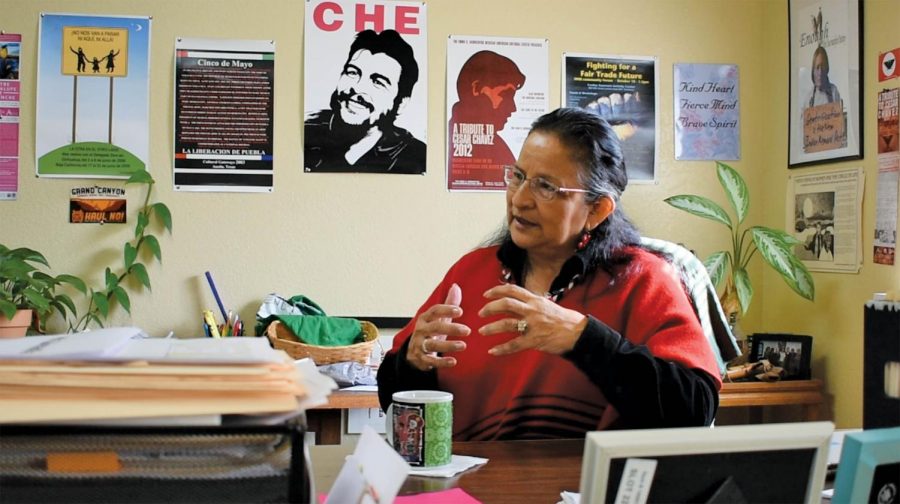Susana Almanza, Environmental Justice Activist: Struggle, Victories, and Advice
Almanza, the leader of PODER, sits in her East Austin office. Almanza has been an environmental activist for over 20 years.
When she isn’t fending off multimillion-dollar oil corporations from polluting East Austin, Susana Almanza continues her tradition of remembering the legacy of the Cesar Chavez, the great farmworker-rights activist.
Susana Almanza is the Director of PODER, an environmental justice organization based in East Austin that stands for “People Organized in Defense of Earth and Her Resources.” Through this capacity, she led the 18th annual Cesar Chavez march. She agreed to an interview three days after the event.
Almanza invited me in the PODER office with a smile. Immediately, I was struck by the colors of the walls. A myriad of event posters, each demanding justice, told stories of Almanza’s decades of activism. One poster read “Gentrification is the new Indian Removal Act.” Another depicted a smiling Che Guevara. At first glance, these posters’ revolutionary protest clashed with Almanza’s sweet elderly smile. A closer look will show that her smile and rebellion complement each other. As Almanza puts it, in the true struggle for justice, “we are fighting big monsters; they’re not little ones.”
We sat down and talked about PODER’s victories against environmental racism. Almanza explained that a PODER-prompted City of Austin study found that 90% of all the industrial zoning was East of the highway. The zoning of these chemical-polluting plants “look[ed] at people of color as indispensable…like ‘it’s okay if we pollute them and if they die or if they get cancer,’” according to Almanza.
For 35 years, fuel storage tank facilities (“Tank Farms”) polluted a predominantly Latino and African American neighborhood in East Austin. In 1992, PODER discovered that the 52-acre Tank Farms—owned by Exxon, Mobil, Chevron, Star Enterprises (Texaco), CITGO and Coastal States—had violated carcinogens air emission regulations and had contaminated groundwater. But after PODER’s 18-month campaign, the Tank Farms were relocated and the oil companies agreed to remediation.
Another polluter of East Austin communities was the Holly Power Plant (HPP). The plant’s 65 kilovolt lines “came through the neighborhood and…zapped people because they were too low,” said Almanza. The plant exceeded federal noise levels, emitted high levels of nitrogen oxide, and caused several fires that endangered local communities.
After about twenty years of PODER’s activism, the HPP was closed in 2007. PODER has also been instrumental in the relocation of the “mini” landfill created by the Browning Ferris Industries (BRI) recycling site, which led to rodent infestations and public health concerns. Currently, PODER’s main focus is protecting East Austinites from the oppressive effects of gentrification.
As her motivation, Almanza cites her spirituality, her indigenous culture, and her parent’s example of respect. For young activists, Almanza’s advises environmentalists to build coalitions, find at least one other person to struggle with, occasionally howl at the moon, and to “take off your shoes, go outside, and feel the Earth.”







